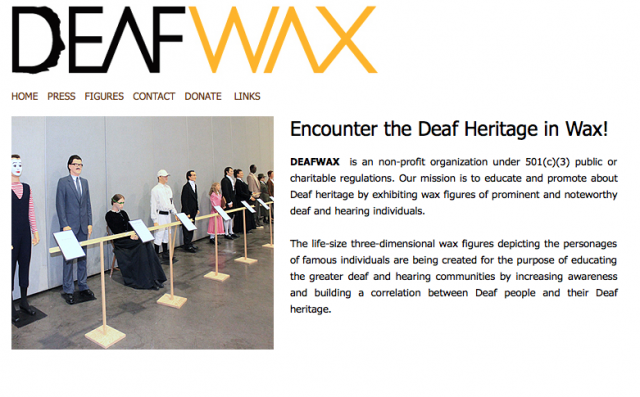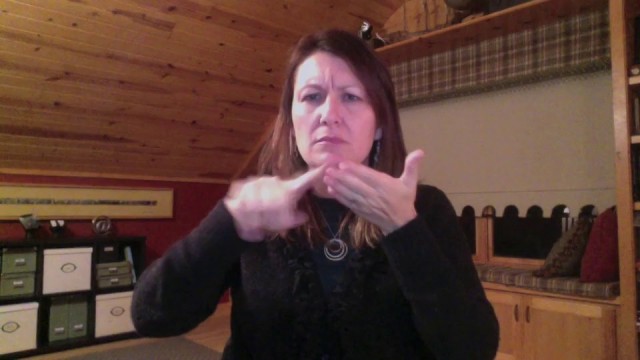Originally appeared in Silent News, August 2001.
Today I had yet another nasty reminder of how ignorant hearing people generally perceive deaf people.
The day actually started out productive, even though my nine-month-old puppy was giving me attitude, but everyone is entitled to having doggy days. Adele came in to let me know that a woman was going to come in to talk with us about her son wanting to learn sign language. What was significant about this woman, who I will call Jenny, was that she was the granddaughter of a well-known interpreter who helped found a deaf organization. Jenny’s mother also was a teacher of the deaf. Bonus point? Her adorable 12-year-old son was learning sign from deaf schoolmates.
I came out of my cell, er, my office to meet Jenny, and she seemed nice at first. When I learned of her strong ties to the deaf community, I was a little surprised that she didn’t know sign language. After some small talk about my puppy and her son’s involvement with the deaf community, I jokingly said (with Adele voicing for me), “How come you don’t know sign language if your grandmother, mother and son know it?”
Jenny, not looking at me, said defensively, “I’m an audiologist. Why would I need sign?”
Oh, boy.
I looked at her, and responded with a quick smile, “To communicate with me!” I initially thought that she was joking. However, after my response, it became quite apparent that she was not at all joking.
What followed was a power struggle. Why didn’t I wear hearing aids? I told her I didn’t have a need for them in my life, though it was very much an individual choice. She said I obviously couldn’t speak because, “You’re signing now instead of speaking to me.” She also implied that I wasn’t successful because of my inability to speak or hear. I pointed out that I was in a very good job, with a good life and a nice dog (who was by now sleeping, obviously bored by the conversation). I then pointed out that I clearly could communicate better with her than she could with me, since she couldn’t understand me while I could lipread her just fine. Changing the subject, she asked the name of my dog. I told Adele not to voice, and to drive my point home, I fingerspelled the name of my dog: “Isre.” After an awkward pause while she looked dumbfounded, I instead wrote the name down, and showed it to her. She got the point.
By now I was seething inside (and it was probably obvious to her), but I smiled politely and said that I would go home since it was nearly 5:00 p.m.
As I was leaving, her sweet little son said apologetically, “Please, please don’t mind my mom!” I shook my head with an “Oh, don’t worry!” smile as if the thought of minding his mother had never occurred to me.
I was shaking from shock when I got into my truck. How could she come into the office of one of the oldest deaf/hard of hearing publications in the country and insist she didn’t need to know sign language because she was an audiologist? How could she even try to imply that I wasn’t successful because I didn’t speak?
And those people control the future of our children?
A few years ago, I had to go in for a hearing test to complete my Peace Corps invitation packet. The audiologist, a very friendly young woman, came to take me to that infamous closed-in metal room for the testing. She spoke entirely at first without offering me any paper and pen, but she was easy to lipread so I didn’t ask for paper yet. After the test, she asked me how I had become deaf. I explained that my parents were deaf, and that I was born deaf. She thanked me for my time, gave me my test results, and I left the office.
My friend, however, had an entirely different experience only a few weeks before. The same audiologist found out that Mary came from a hearing family, and started to offer her information on cochlear implants to the point of where Mary felt almost convinced to get one. She left the office wondering, “What if I had been from a deaf family?”
Well, her deaf family question was answered with my visit. I never once was offered information on cochlear implants. The audiologist simply dismissed me as soon as she found out I was from a deaf family – not to the point of where I felt rejected, but the subject was never once brought up.
But that’s not the point I’m trying to make here.
My point is: why aren’t more audiologists neutral?
Do they think it’ll hinder their success stories if they don’t sign? Don’t they realize they’ll reach a far higher number of people if they use sign? Don’t they realize that the more they use sign language, the less resentment they will encounter from deaf people in general? Don’t audiologists know that the more neutral they are, the more appreciative the deaf and hard of hearing community, and more importantly, parents of deaf and hard of hearing children would be of them?
Jenny immediately placed the burden of my ‘inabilities’ on me. What kind of stereotypes was she teaching her son (apparently not too many if he was apologizing for his mother)? What did she say about people like me? Did I come across as an angry, militant deaf person to her simply because I chose to sign? Granted, she was only one audiologist, and can hardly represent a whole profession. Still, it really threw me back to the days where my parents were blamed for my inability to speak at an individualized education plan meeting, until my mother stood up and pointedly said to the audiologist using voice, “Does my preference of using signing mean I’m hindering my daughter’s language development? Do you know I can speak and hear pretty well on the phone?” The audiologist sat down, flabbergasted with the new information that my mother spoke perfectly well. She never made that accusation again against my parents again.
Stereotypes are powerful. They bind and trap. Yet, would that exchange have taken place if I didn’t have my own biases about audiologists? Granted, I didn’t know she was an audiologist until after I asked her why she didn’t sign. Even so, is it fair of me to expect all audiologists to learn sign? Is it fair for them to expect all deaf people to be failures because of an inability to speak or refusal to wear hearing aids?
These are questions to be pondered carefully. But the lesson I took with me that day: stereotypes aren’t always necessarily multigenerational. And that’s a relief.
Copyrighted material. This article can not be copied, reproduced, or redistributed without the written consent of the author.


